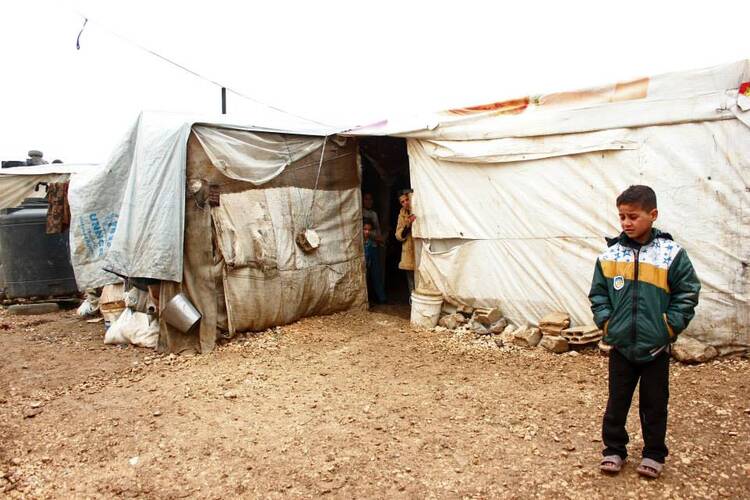U.S.C.C.B. officials warn that the Syrian refugee crisis—4 million people have fled the war-torn state—has reached a dangerous “tipping point.” Turkey alone has absorbed almost 2 million refugees from Syria and is now the only regional power allowing more refugees in. But for how much longer, officials wonder, can Turkey accept the burden? In addition to the Syrians, waves of other refugees—as many as 103,000—have already washed across the Turkish border from Iraq. Meanwhile conflict in both nations continues to rage, driving more Christians, Yazidis and both Shiite and Sunni Muslims from their communities.
Worried about its capacity to absorb many more refugees and the possibility of terrorist infiltration, Jordan has already closed its borders to people seeking to escape from Islamic-State controlled regions. “Without more international support, we will find Syrians fleeing extremists being turned away and forced back to danger,” said Anastasia Brown, interim executive director for U.S.C.C.B.’s Migration and Refugee Services. Turkey has continued to allow refugees in but now, especially in communities near the border with Syria, faces becoming “overwhelmed" by the crisis.
A delegation of U.S.C.C.B. officials which visited the region in late 2014, released a report on March 6—“Refuge and Hope in the Time of ISIS”—looking at the plight of Syrians in Turkey and during a growing and perilous migration to Europe through Greece and Bulgaria. Many other Syrians seeking to escape the violence have become part of the vast undocumented exodus across the Mediterranean, a humanitarian crisis frequently lamented by Pope Francis.
Of special concern is the impact the crisis is having on as many as 2 million Syrian child refugees. Among those are many children who have lost or been separated from parents or family members, who have a special claim on protection. “The number of unaccompanied children and other vulnerable children from Syria and elsewhere is rising, yet there are few protection mechanisms in place to identify and rescue them from harm,” said Nathalie Lummert, director of Special Programs for M.R.S./U.S.C.C.B. “What we are seeing is an exodus of the next generation in Syria, with little hope for their future.”
The delegation also expressed grave concern for the plight of religious minorities, who are targets of extremists in the region. Assyrian and Chaldean Christians, along with Yazidis, are at risk of their lives. “Without a dramatic response to this unprecedented humanitarian challenge, we will continue to see ongoing suffering and even death in this population, especially among the most vulnerable,” Brown said.
According to the report, Turkey has spent $4 billion to serve the needs of the Syrian refugees, while U.N. refugee officials report that international protection and humanitarian needs in Turkey are funded at only a 29 percent of the appropriate level. There is a growing lack of protection, livelihood, housing, education, health care, and food for the refugees, especially for those in urban refugee settings who are unregistered or who are recent arrivals from Syria and Iraq. The United States has been the top donor in humanitarian relief, according to Brown. All the same its commitment so far still represents “a drop in the bucket.”
“The global community, led by Europe and the United States, needs to increase its support in order to prevent a humanitarian crisis,” Brown said.
How vast is this humanitarian problem? Brown explains that so many are now fleeing Syria and Iraq that those able to meet with U.N. refugee officials are being put on waiting lists—not to be extracted from the troubled region, but just to be registered as refugees—that are backlogged until 2020 and 2022.
That means families will be “stranded” in these Turkish communities without a status that will allow parents to properly settle their families, find health care, enroll their children in school and legally accept work. Worse, according to Brown, must unregistered refugee families have allowed their children to skip school and take whatever jobs they can find. It is far easier for children to find gray market employment than their parents and mere survival is now trumping the future. The flood of undocumented refugees meanwhile creates resentment in host communities struggling to absorb the burden, generating tensions of the refugees’ impact on wages and employment opportunities.
Brown argues that the United States and European Union not only have to do much more to assist the resettlement, support and protection of refugees scattered across the region, they must quickly reset refugee quotas to levels that more reasonably address the severity of the crisis. “Right now, hundreds of Syrians have come to the United States,” Brown complained, “versus the thousands who need assistance.”
Last year, the United States accepted less than 70,000 refugees from the entire world; many thousands need to be extracted from this troubled region alone. U.S. refugee policy needs to be re-evaluated, Brown said, to effectively function as the “timely and…live-saving mechanism it is meant to be.”
Many of the refugees are Christians driven from ancient communities. Though it is the desire of most parties, according to Matt Wilch, refugee policy advisor for MRS/USCCB, “to preserve the church in the Holy Land,” these Christians warrant special protection and support. Those who wish to remain in the region on the chance that they may someday return to their villages need to be supported and protected in the meantime, their children educated. But those who wish to escape into more humane conditions should also have that opportunity.
“The most vulnerable should have the option to move on to the United States and Europe,” said Brown.








